#prosecutor ito
Explore tagged Tumblr posts
Text
Remade this BN6 meme I saw a while back, because the original(right) only exists as a low quality jpeg from an unarchived blog on now dead cohost.
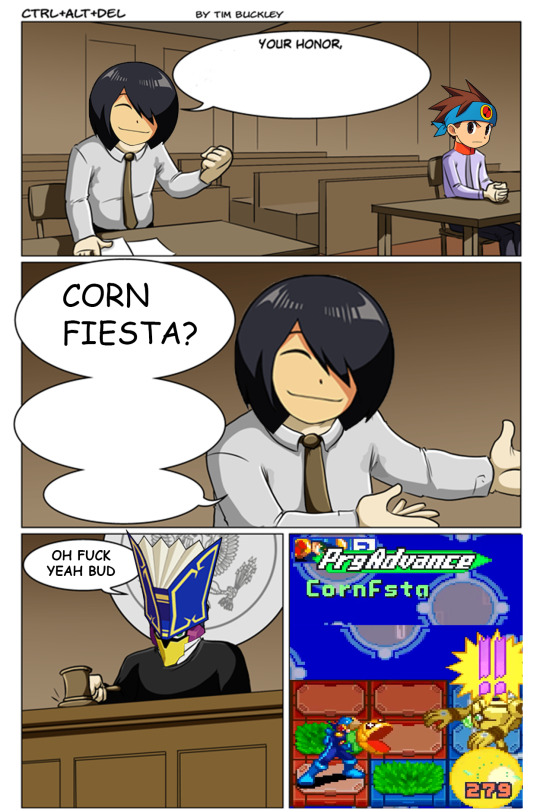

#megaman#rockman#megaman battle network#rockman.exe#prosecutor ito#lan hikari#hikari netto#judgeman.exe#elementman.exe#if anyone knows who made the original I'll gladly credit them
22 notes
·
View notes
Text
All-Seeing Red

Silly little drawing of a dystopian Prosecutor Ito in a dystopian hellscape. And for onCE HE HAS HIS EYES OPEN YEEEEE
Another favorite battle network character of mine, next to Raika
#mega man battle network#Prosecutor Ito#digital art#original art#ITO HAS HIS EYES OPEN YOOOOO-#I gave him eyelashes because yes 💅
7 notes
·
View notes
Text
[FANART] Remembering my Deleted Friend

Another WIP finished, this one started on 2022, but finished this year.
I made a Prosecutor Ito alternative outfit that made him look more formal goth or at least edgy. I think this was originally vent art?
I wanted to originally draw just Prosecutor Ito with a background, but due to lack of ideas, I came up with another idea that was the reason why this drawing took time to be finished.
I drew JudgeMan.EXE from an uncommon angle, just as a memory. A static memory... But drawing JudgeMan.EXE at that angle and with limited references was a STRUGGLE. But eventually I had to finish it.
Hope you like it! >Elec_
Made in: CLIP
= Ko-Fi =
#judgeman.exe#prosecutor ito#mega man battle network#mmbn#mega man#digital art#fanart#black and white#monochrome#artists on tumblr#elecalice works#get equipped with: queue
4 notes
·
View notes
Text
I'M SO HAPPY I FOUND A FANFIC WITH PROSECUTOR ITO, VIC AND YUIKA!!
And with the ship of Vic x Ito! (Cloudy Justice!)
AND is a Purge AU! I'm so curious to read the writer's idea for the Purge in the MMBN world.
I'm so happy to find and read this fanfic. At the moment of this post, it's currently in Chapter 2. I'll be patiently wait for the next chapters!
#cloudy justice#MMBN Vic#prosecutor ito#mega man battle network#mmbn#mmbn6#fanfic#fanfiction#not my writing#elec being a fangirl#comfort character posting
2 notes
·
View notes
Text

ㅤㅤ ㅤㅤ──────── ⎛⎝ ≽ > ⩊ < ≼ ⎠⎞ ────────
10 people I want to know better
ty @miwkstowp 4 the tag ♡(˃͈ દ ˂͈ ༶ ))
⤿ Last Song: ヴァージン・スーサイド -kinoko teikoku ⤿ Favorite Color: red (not the rlly bright one bcs it hurts my eyes..) ⤿ Last Movie: the prosecutor (not my choice ^^'') ⤿ Last Book: ito junji best of best short story collection (showed it as a bedtime story 4 my roommate) ⤿ Sweet, Spicy or Savory: depends on mood tbh :p ⤿ Last Thing I Googled: "caesar salad" to explain to a friend how a man from ancient rome became a salad ⤿ Current Obsession: whatevr songs im looping, sims 2/4, yakuza 3.. (50+ hrs, still in ch 5..) ⤿ Looking Forward To: trying 2 (properly) import mmd motions to sims 4, making every vocaloid/utauloid ik into sims,, bedrot n doomscroll :D
erm.. idk who 2 tag but i double dog dare anyone who wants to make this 2 do it too ((0v0))
6 notes
·
View notes
Text

On the American football field, OJ Simpson ran around, past and through defenders with almost unmatched success. “The Juice” had legendary status, as both a collegian and a pro.
Undeniably handsome and charismatic, he appeared in films and on TV, and was known in the US for a Hertz television commercial in which he sprinted through an airport, hurdling all obstacles.
But the most enduring memory of Simpson, who has died aged 76 of cancer, will be a race he did not win, the slow-motion chase on 17 June 1994 during which he was a passenger in a white Ford Bronco, armed with a gun and threatening to kill himself, followed through empty Los Angeles freeways by a small fleet of police cars and swarming television helicopters broadcasting live to the world.
Simpson had agreed to surrender to authorities and be charged with the murder of his ex-wife, Nicole Brown Simpson, and her friend Ronald Goldman, who had been found stabbed to death five days earlier outside her home in LA. Instead, he ran. The huge audience drawn by the Bronco chase would soon be dwarfed by the worldwide attention given to the trial. Coinciding with the rise of the 24-hour news cycle and specialist television channels such as Court-TV, it became a three-ring circus for electronic tabloid celebrity journalism.
The ringmaster was Judge Lance Ito, preening for the cameras, starstruck and deferential to Simpson’s “dream team” of big-name lawyers. They included national figures such as Melvin Belli, Alan Dershowitz and Robert Shapiro, but the dominant presence was the flamboyant local lawyer Johnnie Cochran, who had built his reputation filing suits against the Los Angeles police department.
Just as important may have been Simpson’s friend and former personal lawyer Robert Kardashian. After the murders, Simpson stayed at Kardashian’s house; when police arrived, Kardashian carried away a garment bag and some have speculated that it contained evidence of Simpson’s guilt. By returning to practise law as part of Simpson’s defence team, Kardashian was shielded against having to testify as to the contents of the luggage.
The trial lasted more than eight months, with Simpson’s team burying the prosecutors Marcia Clark and Chris Darden under a landslide of discovery (supplying and requesting vast quantities of material) and challenges to every piece of evidence.
Even Simpson’s cell-phone conversations during the Bronco chase, heard around the world, were ruled inadmissible. Clark’s decision to focus on Simpson’s 1989 charge of domestic abuse against his former wife backfired when the trial turned on the testimony of an LAPD detective, Mark Fuhrman, whose reliability was called into question when he was found to have lied about having used the N-word. This allowed the defence to recast the trial as a referendum on racism, positing that Simpson had been framed because he was black.
The climax came when Simpson tried on a glove, found at the crime scene, that was a key piece of evidence. Ignoring that it had been blood-soaked and repeatedly frozen and thawed, Cochrane seized upon Simpson’s inability to squeeze his hand into the glove. Incanting “If it does not fit, you must acquit”, he had found the visual metaphor to proclaim his client’s innocence. The jury took less than four hours to find Simpson not guilty, although Ito postponed the announcement until the next day to get maximum television exposure.
It seemed that all of the US, and much of the world, watched the verdict. Reaction was divided on racial lines: even sympathetic white people were convinced of his guilt, black people were sure he had been framed. Simpson announced publicly he would not rest until the “real killer” was brought to justice.
Within a year, Kardashian was publicly voicing his “doubt” about his friend’s innocence, while the Goldman and Brown families filed a wrongful death suit in civil court. With new evidence, and a lesser burden of proof than in criminal trials, Simpson was found guilty, and ordered to pay $33.5m in damages.
Born Orenthal James in San Francisco, he developed rickets and wore leg braces until he was five years old, by which point his parents, Eunice (nee Durden), a hospital administrator, and Jimmy (James) Lee Simpson, a janitor and cook, had divorced. He was raised by his mother in the Potrero Hill projects, where he ran with a gang called the Persian Warriors. His father left the family when OJ was four. It was not until later in his childhood, when he went to visit Jimmy unannounced, that he discovered his father was gay. Jimmy performed as a drag queen in San Francisco and died in 1989.
OJ turned to sports at Galileo high school, becoming a star of football and track. By the time he had played his second year of football at San Francisco City College he was being hotly pursued by major universities keen on his talent as a running back. He chose the University of Southern California in Los Angeles.
His rickets had left him bow-legged, which helped him make quick cuts (sudden changes of direction), and accelerate out of them. At 6ft 2in and 15st 2lb (96kg), he was powerful enough to knock tacklers over, and with a speed of 9.4sec over 100 yards, fast enough to outrun them. Indeed, soon after entering USC, he was part of a 4 x 110-yard relay team that set a world record of 38.6 seconds, which still stands, as the 440-yard distance was soon afterwards discontinued.
That autumn on the gridiron, he led the nation in rushing (running rather than passing or kicking), the highlight being a late 64-yard touchdown run to help USC defeat its arch-rival UCLA. In 1968, he won the Heisman trophy, awarded to the top college player, by the largest ever margin.
He was picked first in the NFL draft, by the lowly Buffalo Bills, but his transition to pro football was not smooth. The coach, John Rauch, believed in a downfield passing game, which did not suit Simpson. But when Lou Saban took over as coach in 1972, Simpson became the focus of the Bills’ offence. Saban believed in power running, and built a powerful young line to clear Simpson’s way. They became known as “the Electric Company”, because they “turned on the Juice”.
In 1973, Simpson became the first player to rush for more than 2,000 yards in a season, as the Bills made the playoffs. He was a first-team all-league pick (best in the league) every year between 1972 and 1976, but seven games into the 1977 season he suffered a severe knee injury. In the off-season, Buffalo sent him home, trading him to the 49ers. Simpson played two seasons in San Francisco, but after the knee surgery he was a shadow of his former self. He retired after the 1979 season, and returned to acting.
While still at USC Simpson had appeared in uncredited bit parts in TV series such as Dragnet, Ironside and It Takes a Thief; he received his first credit in 1969 on Medical Center. In 1974 he appeared in his first films, The Klansman and the disaster epic The Towering Inferno.
He had a profitable sideline in endorsements, and his series of Hertz car-rental ads ran from 1975. His career peaked in 1977, with a role in the first episode of the hit TV miniseries Roots, and a decent part in Capricorn One, a film about the faking of a landing on Mars. But his next film was ill-chosen – Michael Winner’s thriller Firepower (1979) was a bomb – and for the next few years most of his film work was done for his own production company.
In 1983 he joined the commentary team for ABC’s Monday Night Football, the highest profile sports programme in the US. Though he lasted for only three seasons, he moved on to a starring role in an early HBO comedy series, 1st and Ten, set in the world of pro football, which ran from 1986 until 1990. This tapping of comedy beneath his image led to his being cast as the incongruously named detective Nordberg in The Naked Gun (1988).
In that movie and two sequels, Simpson played the dull-witted slapstick foil to Leslie Nielsen, the butt of countless jokes playing on racial stereotypes and his sports celebrity.
At the time of the murders, Simpson had starred in the pilot film for a TV series, Frogmen, about an A-Team-like group of Navy Seals. Because of knife combat shown in the film, it was confiscated by the LAPD as evidence and has never been seen. His endorsement work dried up immediately, and, in the wake of the civil decision against him, he moved to Florida, where more of his assets, including his football pension, could be protected.
He did not participate in the 1995 TV movie The OJ Simpson Story, which starred Bobby Hosea, but more than 20 years later, two shows about the trial drew large audiences, showing the public fascination with the case: The People v OJ Simpson, a dramatisation starring Cuba Gooding Jr, and OJ: Made in America, a true crime documentary series.
In 2001 his house in Miami was raided by the FBI, searching for evidence of drug running and money laundering. Five years later it was announced that a book by Simpson, to be titled If I Did It, was to be published, with an accompanying special on Fox TV.
The book and programme were soon cancelled and, after lawsuits, a Florida bankruptcy court awarded the rights to the book to the Goldman family, who published it in 2007 with the “If” of the title in extremely small print, and added the subtitle Confessions of the Killer.
Simpson maintained some income from selling his autograph at sports memorabilia shows, although he had been legally stopped from copyrighting his name or nicknames for commercial benefit.
In September 2007 he and a group of friends burst into a hotel room in Las Vegas and retrieved from two dealers in sports memorabilia items that Simpson alleged had been stolen from him. He was arrested and charged with armed robbery and kidnapping. The following year he was found guilty, and sentenced to nine to 33 years in prison, one for each million dollars he owed the Brown and Goldman families. Amid reports of his failing health, Simpson was released on parole in 2017.
In 1967 Simpson had married Marguerite Whitley. They had two daughters, Arnelle and Aaren, and a son, Jason. Aaren drowned in the family swimming pool in 1979, the same year that the couple divorced. In 1985 he married Nicole Brown. They had a daughter, Sydney, and son, Justin, and divorced in 1992.
He is survived by his children and three grandchildren.
🔔 Orenthal James Simpson, footballer, actor and convicted criminal, born 9 July 1947; died 10 April 2024
Daily inspiration. Discover more photos at Just for Books…?
5 notes
·
View notes
Text

Art. 48. In all cases of annulment or declaration of absolute nullity of marriage, the Court shall order the prosecuting attorney or fiscal assigned to it to appear on behalf of the State to take steps to prevent collusion between the parties and to take care that evidence is not fabricated or suppressed. In the cases referred to in the preceding paragraph, no judgment shall be based upon a stipulation of facts or confession of judgement.
Ang pagprepresenta ng petitioner o nagsampang asawa ay tinatawag na "trial proper" at pwedeng ischedule ng abogado sa kanyang vacation at hindi siya required na magtagal sa Pilipinas. Ang mahalaga ay dumating ang petitioner sa araw na tinakda ng abogado niya para sa pagpresenta niya ng evidence at pagbigay niya ng testimonya sa korte upang patunayan ang kanyang mga alegasyon sa petition for annulment of marriage. Kung natapos na siya magbigay ng testimoniya sa korte under direct examination at siya ay nacross examination na ng Fiscal/Public Prosecutor, pwede na agad siya umalis ng Pilipinas at bumalik sa bansa kung saan siya nakatira/nagtratrabaho.
Bibigyan din ng korte ng notice at pagkakataon ang iyong inihablang asawa na magpresenta ng kanyang ebidensiya. Pagkatapos nito ay, magdedesisyon na ang korte. Kung ang decision ng korte ay para sa annulment, kailangang maging final and executory ito. Mayroon 15 days ang iyong asawa, fiscal o OSG na magfile ng Motion for Reconsideration at i-apela ang desisyon sa Court of Appeals at kung hindi, magiging final and executory ito after 15 days mula sa pagtanggap ng decision ng korte.
Kailangan ba na present ang petitioner sa paglabas ng desisyon sa annulment of marriage at declaration of nullity of marriage?
Hindi. Ang desisyon ay pinapadala ng korte sa pamamagitan ng postal office sa address ng petitioner at hindi na kailangan ang presensiya niya sa Pilipinas. Kailangan lamang na ito ay mareceive ng petitioner's counsel upang maging final ito pagkatapos ng 15 days mula sa pagkareceive ng OSG at respondent ng desisyon.
0 notes
Text
Federal prosecutor Lesley Wolf who led criminal probe into Hunter Biden is silenced by DOJ from sharing information with congressional investigators
https://www.dailymail.co.uk/news/article-12892355/Lesley-WolHunter-Biden-investigation-prosecution-DOJ.html?ns_mchannel=rss&ns_campaign=1490&ito=1490&utm_source=dlvr.it&utm_medium=tumblr
0 notes
Text
0 notes
Text
Went through an old art book, found these
Yep, this is an old art book of mine. Back in my Lobotomy Corporation × Mega Man hyperfixation (I still enjoy both)

So, Lumine's final move in Mega Man X8 is called Paradise Lost. Coincidentally, WhiteNight's E.G.O Suit is also called Paradise Lost

This fit too well. Prosecutor Ito in Judgement Bird's E.G.O Suit? Too perfect.

Uh, IDK why I gave Volnutt the Happy Teddy Bear E.G.O, but... whatever

I've seen Aile appear in much more content than Vent, so Adoration E.G.O it is!

I'm still questioning why I gave Vent the Funeral of Dead Butterflies E.G.O Suit???

Giving Giro Silent Orchestra's E.G.O Suit makes way less sense now that I look back
Lmk if I should post some art I did for a *lot* of the songs on my Spotify
#original art#traditional art#mega man battle network#mega man zx#lobotomy corporation#melting love#silent orchestra#happy teddy bear#funeral of the dead butterflies#judgement bird#Aile mega man zx#Vent mega man zx#girouette#Lumine mega man x8#mega man x#Prosecutor ito
1 note
·
View note
Text
[Jailed in Sharo] Ito in the prison uniform

I still have pending to do the fanfic "Jailed in Sharo". But I did have this sketch of Ito wearing my idea for the prison uniform for the Criminal Microdistrict where he has to reside for a time.
Yes. Those are inspired by actual uniforms. I did searched for references.
I'll make the actual fanfic eventually, I swear...
Hope you like it!
_Elec
= Ko-Fi =
#prosecutor ito#mega man battle network#Mega Man Battle Network 6#mmbn#mmbn6#fanart#Jailed in Sharo#artists on tumblr#mega man#traditional art#elecalice works
5 notes
·
View notes
Text

Well, I did this meme about my comfort characters.
Especifically, how it feels trying to find content about my comfort characters. Not just official content, but also and most importantly, fanworks or fan content. Like fanarts, fanfics, etc.
Elec Man (Mega Man Classic): He's one of the most popular Robot Masters. He has a LOT of fanwork.
Remy (Street Fighter III: 3rd Strike): He's a polarizing character in the SF community, but he's gaining more attention and love these days. He has a good size of fanwork.
Doctrine Dark (Street Fighter EX series / Fighting EX Layer): He was originally going to be deep down with Ito, but he's gaining more fanwork. He's one of the most popular characters of the SFEX/FEXL. Not as popular as Skullo but he's popular. He has a small and decent size of fan content.
Prosecutor Ito / Satoru Roppo (Mega Man Battle Network 6 / Rockman.EXE 6): He has really... REALLY few content. There's a good size of Ito content on Pixiv, but I noticed there are deleted Ito content from there (That I found thanks to Tumblr posts). While in the English community, really few content. As well as, well. He's a Super UNDERRATED character. Hence why he's deep down on the meme. I had to dig down or "internet dumpster dive" a LOT in order to find content of him.
It sucks to be a Prosecutor Ito fan... ;-;
#elec being a fangirl#elec memes#comfort character posting#comfort characters#meme#sf3 remy#doctrine dark#elec man#prosecutor ito
3 notes
·
View notes
Text
I made some ocs for Killer Frequency because I’m obsessed so lemme introduce you to the Legal Team :D
To start things off we have Wendy Von Skenazy who is the Chief Prosecutor and has taken on the case of Henry Barrow and Teddy Gallows Jr in the aftermath of the events of the game. She is a no nonsense woman with a very strict demeanor and is very determined to put Henry and Teddy behind bars for their crimes. She travels down to Gallows Creek to take on the cases after being called by her cousin Trent Henson, who she owes a favor to...

Up next we have Natoma, who is Wendy’s assistant and a medium/seer with high incredible powers. She is a young woman who is eager to help out in anyway she can, and Wendy has brought her along to Gallows Creek to help her win her two cases with Natoma’s powers. Natoma has the ability to summon the dead, see spirits and other entities, and even allow herself to be possessed so that the dead can speak through her. Her abilities will prove to be useful when the day of the trail arrives...

Finally we have Trent Henson, Wendy’s cousin and an independent private investigator. He moved to Gallows Creek 5 years prior and secretly started looking Ito the case of George Barrows, having his suspicions that Teddy and his father were involved in covering up what happened. After all hell broke loose on Whistling Night, Trent believes that he has more than enough evidence to convict Henry Barrow and Teddy Gallows Jr but their defense attorneys are determined to make sure that the two don’t get any prison time. With no one else willing to prosecute the two criminals, Trent calls up his cousin Wendy to help put away Henry and Teddy for good...

I hope you guys like them :3
#killer frequency#killer frequency ocs#wendy von skenazy#natoma the seer#trent henson#the legal team
4 notes
·
View notes
Text
Who Is Higuchi Ichiyou? (Spoilers if you haven’t fully watched/read Bungou Stray Dogs)
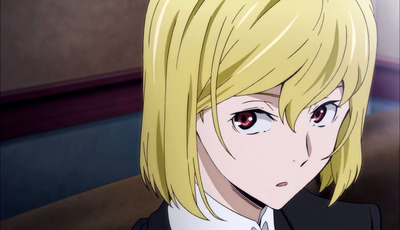
Higuchi Ichiyou, a port mafia member and the one who commands the Black Lizards. She isn’t respected by the mafia, she isn’t useful to the mafia ability wise but why is she here?
Let us begin from the beginning.
Who is the real life Higuchi Ichiyou?
She was born on May 2, 1872 in a nagaya (row house) on the premises of the Tokyo prefectural office (present Chiyoda Ward, Tokyo Prefecture) in Uchisaiwaicho, Ichi shoku, Daini daiku, Tokyo-fu (Tokyo Prefecture). Her real name was Natsu HIGUCHI. Her father was Tamenosuke (Noriyoshi) HIGUCHI and her mother was Ayame, the fifth daughter of the Furuya family; Ichiyo was their second daughter. She had an older sister (Fuji) and two older brothers (Sentaro and Toranosuke), and was followed by a younger sister (Kuni). Making Higuchi Ichiyou the fourth child.
Her father, Noriyoshi, was a peasant in Nakahagiwara Village, Yamanashi County, Kai Province (present Koshu City, formerly Enzan City). Her grandfather seems to have been familiar with creative writings such as haikai (seventeen-syllable verse) and keisho (the most important documents in Confucianism); it is said that Noriyoshi preferred academics to farming and, as his marriage with Ayame was not permitted, they practically eloped to Edo. Noriyoshi began as a servant in the Bansho shirabesho (a government-run Western studies education and research institute) and, by good fortune, became a jikisan (immediate retainer) of the bakufu (Japanese feudal government headed by a shogun) by buying a kabu (a right to become doshin) of doshin (a low-ranked official) in 1867. After the Meiji Restoration, he became a low-level official and acquired the status of shizoku (a family or person of samurai ancestry), but was dismissed in 1876. After that, he made a living by working as a real estate broker and similar things.
As a young child, Ichiyo was raised in a family of moderate means, and she enjoyed reading from the time she was small; she read kusazoshi (illustrated story books) and it is said that she read through "Nanso Hakkenden" (a story of eight samurai and a princess of the Satomi family in the Nanso region) by Bakin KYOKUTEI when she was seven years old. In 1877, she entered Hongo Shogakko (Hongo Elementary School), but could not continue because she was too young, so she enrolled in Yoshikawa Gakko (Yoshikawa School), which had been established privately by Tomikichi YOSHIKAWA. In 1881, Toranosuke, her second older brother, set up a branch family and apprenticed himself to an earthenware painter. The family moved to Okachimachi, Shitaya Ward in the same year, so in November, she transferred to Seikai Gakko, a private school, in Ueno Motokuromoncho. She graduated from the fourth grade of the advanced course at the top of her class, but left the school without advancing to the upper grades. It is said that this was because her mother, Ayame, believed that studies were unnecessary for women.
On the other hand, it is said that her father, Noriyoshi, recognized his daughter's literary talent and let her learn waka from his acquaintance, Shigeo WADA. In 1886, she entered the waka school 'Haginoya,' run by Utako NAKAJIMA, through an introduction by Choan TODA, an acquaintance of her father from the days of the Tokugawa shogunate. In this school, besides waka, she studied classic literature and Japanese calligraphy of the Chikage school; dynastic style literature, such as The Tale of Genji, was the motif of Ichiyo's early works. During her time at Haginoya, Ichiyo met her close friends Natsuko ITO and Tatsuko TANABE and gave lectures as an assistant teacher. At that time, Haginoya was a waka school attended by the wives and daughters of the former regime's privileged classes - such as court nobles, former roju (senior councilor of the Tokugawa shogunate), and former domain lords - and of the Meiji government statesmen and military personnel. Although Ichiyo was shizoku, since her family had been farmers, she was treated as a commoner; she became introverted, and senior pupils from the upper social class called her 'monotsutsumi no kimi' (literally, close-natured person). When the first annual New Year's opening ceremony since Ichiyo had entered the school drew near, the topic of conversation among the well-bred young ladies turned to clothing and festive dress, well beyond the range in which the daughter of a low-class government official could compete. However, she quashed her feelings of inferiority and attended the ceremony wearing old clothes that her parents had borrowed.
Ichiyo's family moved frequently; Ichiyo moved twelve times in her life. In 1888, Sentaro, the first son and head of the family, died; Ichiyo inherited the family and became its head, with her father as guardian. In 1889, Noriyoshi's attempt to establish an association of draying contractors failed, and he died in July of the same year.
Ichiyo's engagement to her fiance, Saburo SHIBUYA, was cancelled. It is said this was due to the fact that, although the Higuchi family was left with a large amount of debt after Noriyoshi's death, Saburo HIGUCHI required a large amount of yuinokin (betrothal [gift] money). At the age of 17, Ichiyo was forced to support her family as its head and, in 1890, she lived in the house of the Nakajima family as a Haginoya apprentice. In September of the same year, she moved to Kikuzaka, Hongo (Bunkyo Ward, Tokyo Prefecture) and, along with her mother and younger sister, was obliged to live a hard life doing needlework and araihari (washing, stretching and drying various parts of kimono). It is said, however, that Ichiyo herself tended to disdain labor, and that the needlework and araihari were conducted by her mother and younger sister.
As Ichiyo's nearsightedness made her bad at detail work, she searched for other ways to earn income. When she learned that Kaho TANABE, a pupil in the grades ahead of her, had obtained a large manuscript fee for her novel "Yabu no Uguisu" (literally, Bush Warbler in a Thicket), Ichiyo made up her mind to write novels. At the age of 20, she wrote 'Kareobana Hitomoto' (Withered Grass). She used her pen name 'Ichiyo' for the first time in an essay written that same year. In order to make a living as a novelist, she also studied under Tosui NAKARAI, who reported on novels for the Asahi Shimbun, frequented a library, and published her first novel 'Yamizakura' (literally, Cherry Blossom in the Dark) in the first issue of the magazine 'Musashino,' presided over by Tosui. Afterwards, Tosui continued to take care of Ichiyo, who lived in dire poverty. Gradually, Ichiyo began to have amorous feelings for Tosui. However, a scandal about their relationship spread (although both were single, the customs of the time did not approve of such associations between a man and a woman without the intent to marry), and so she severed relations with Tosui. As if to emphasize the end of her relationship with Tosui, she published "Umoregi" (literally, Buried Wood), an idealistic novel in the style of Rohan KODA; it was completely different from her previous works, and it became the one that made her career.
Ichiyo became acquainted with Toson SHIMAZAKI and Tokuboku HIRATA, both of whom were well-versed in European literature; having come into contact with naturalistic literature, Ichiyo published multiple works including 'Yuki no Hi' (literally, Snowy Day) in 'Bungakukai.'
Her former fiance, Saburo SAKAMOTO (the Saburo SHIBUYA mentioned above) had become a prosecutor; around this time, he proposed to her, but she refused him. In order to relieve her straightened circumstances, she opened a variety shop which sold cleaning implements and penny candy in Shitaya Ryusenji-cho (present Ryusen 1-chome, Taito Ward), but closed the shop in May 1894 and moved to Maruyama Fukuyama-cho, Hongo Ward (present Nishikata 1-chome). Her experience on this occasion later became the subject of 'Takekurabe,' her representative work. She continued writing. In December, she published 'Otsugomori' (literally, New Year's Eve) in 'Bungakukai' and the next year, in 1895, 'Takekurabe' was published in seven installments, beginning in January.
Between the two works, she published 'Yuku Kumo' (literally, Going Cloud), 'Nigorie,' 'Jusanya' and others; the period from 'Otsugomori' to 'Uramurasaki' (literally, Purple on the Verso) is called her 'miraculous 14 months.'
In 1896, when 'Takekurabe' was published in its entirety in 'Bungei Kurabu,' it won great acclaim from Ogai MORI, Rohan KODA and others; Ogai MORI praised Ichiyo very highly in 'Mezamashigusa,' and many members of 'Bungakukai' began to visit her. In May, she published 'Warekara' (literally, From Myself), and 'Tsuzoku Shokanbun' (literally, Popular Epistle) in "Nichiyo Hyakka Zensho" (literally, The Daily Encyclopedia). Ichiyo had advanced tuberculosis and, when she was diagnosed in August, it was judged hopeless. On November 23, she died at the age of 24 years and 8 months. Ichiyo's life as a novelist lasted only a little over 14 months and in 1897, the year following her death, "Ichiyo Zenshu" (literally, The Complete Collection of Ichiyo's Works), and "Kotei Ichiyo Zenshu" (literally, The Revised Complete Collection of Ichiyo's Works) were published.
Her grave was in the annex temple of Tsukiji Hongan-ji Temple, the Higuchi family's ancestral temple, and was later moved to the Wadabori byosho (mausoleum) of Nishihongan-ji Temple in Izumi, Suginami Ward. Her homyo (posthumous Buddhist name) in Jodo Shinshu sect (the True Pure Land Sect of Buddhism) is Choshoin Shaku Myoyo. Literary materials including handwritten manuscripts and other related materials are kept by the Museum of Modern Japanese Literature and Yamanashi Kenritsu Bungakukan (literally, Yamanashi Prefectural Museum of Literature). Since November 2004, her portrait has been used on the Bank of Japan's five thousand yen note.
Now that we know her real life counterpart lets review her anime/manga self.
As a mafioso, Higuchi proves ruthless and fearsome, not shying away from killing her targets. When confronted by the enemy, she has a distant atmosphere to herself, often strictly no-nonsense and showing little sympathy for them. Quick to act, she seldom tolerates disrespect and detests those who underestimate Port Mafia.
However, Higuchi's personality, as her boss and she herself notes, is rather unfit in the Port Mafia. Beneath her tough exterior, she is easy to upset, hesitant, and quick to question herself. She even contemplated leaving several times, despite the inevitable hardships defection foretold. As a result, her subordinates seldom show her respect, many following her orders out of fear of Akutagawa's wrath. An impulsive spirit also leads her to tend toward drastic measures, consequently going against orders.
Her biggest weakness is her intense, bordering obsessive loyalty to Ryunosuke Akutagawa, whom she obeys almost unconditionally. She often insists on filling in for Akutagawa, worried about his poor health. Unfortunately, her loyalty is met with a frustrated Akutagawa's abusive and harsh treatment, often being called "unnecessary" to him. Nonetheless, Higuchi remains loyal to him. Her instinct to tell Akutagawa everything she knows ends up a key component to luring Akutagawa to the Guild's Moby Dick. However, Higuchi makes up her weaknesses for having a strong resolve, and she refuses to turn away when allies, especially Akutagawa, are in danger.
Thankfully, her determined and honest nature earns her Black Lizard's respect. She proves reliable and incredibly brave, even if her judgment is easily clouded under pressure. Even if questioning her position in the mafia, Higuchi shoulders its burdens and responsibilities to this day, understanding its vital role in Yokohama's safety. She also makes it a point to not be unnecessarily cruel to her opponents, acting strictly professional in Akutagawa and Port Mafia's names.
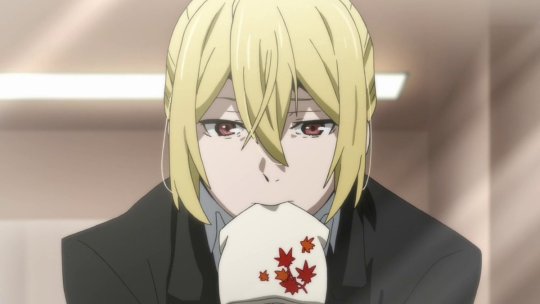
Her composure can often waver. Sometimes she is cool-headed and intimidating, other times easily unsettled and stressed out. Ultimately, she seems to excel more in covert operations than the frontlines, as a tendency to panic leaves her wide open in battle.
Higuchi however has some...strange relationship with the boss however. And this is mostly with what was already established above that the real life Mori Ougai had praised her work which made her very popular. So far in the anime there are three people who Mori Ougai seems close with;
Fukuzawa Yukichi, Yosano Akiko and Natsume Soseki.
Ogai MORI (February 17, 1862 - July 9, 1922) was a novelist, critic, translator, playwright, surgeon of the Imperial Army and Bureaucrat (Senior Official First Class). He was also Army Surgeon General (equivalent to Lieutenant General), Shoshii (Senior Fourth Rank), Order of Merit Second Class, Ko Third Grade, Doctor of Medical Science and had a doctorate in Literature. He is considered one of the great writers of the post-First World War Period ranked alongside Soseki NATSUME. His real name was Rintaro. He was born in Tsuwano Domain, Iwami Province (present Tsuwano-cho, Shimane Prefecture). He graduated from the University of Tokyo, Faculty of Medicine.
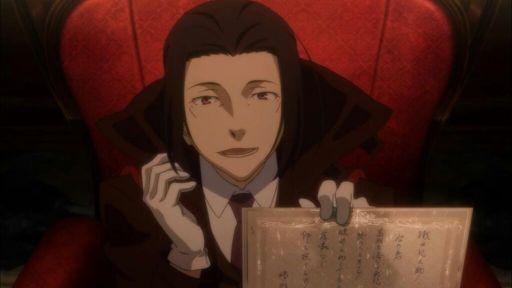
Shiyo Ho was born as the third daughter of Soshichi HO (father) and Tsune (mother) who ran a long-established Japanese confectionery shop 'Surugaya' in Kaino-cho, Sakai City (present-day Kaino-cho, Sakai Ward), Osaka Prefecture. One of her real brothers was Hidetaro HO who later became an electrical engineer. Shiyo entered a school of Sinology (the study of the Chinese classics) at the age of nine and also learned koto (a long Japanese zither with thirteen strings) and shamisen (a three-stringed Japanese banjo). After entering Sakai Girl's School (present-day Osaka Prefectural Senyo Senior High School), she devoured the Japanese classics such as "The Tale of Genji." In addition, she said, under her elder brother's influence, 'by the time I was twelve or thirteen, my greatest pleasure was reading literary magazines "Shigaramisoshi" (and later its successor "Mezamashigusa") and "Bungakukai" as well as novels by Koyo OZAKI, Rohan KODA, and Ichiyo HIGUCHI' ("Myojo" May 1906).
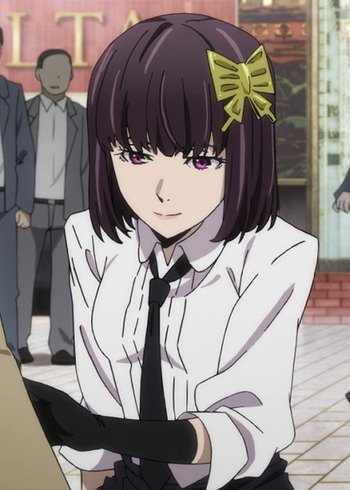
Around the age of twenty she started contributing her poems to magazines while she helped her family business. After participated in the Kansai Young Men's Literary Society, in 1900, she became acquainted with a waka poet Tekkan YOSANO at a poetry reading held at a Japanese-style hotel in Hamaderakoen and contributed her poem to "Myojo," an in-house magazine of Shinshisha (New Poetry Society) founded by Tekkan. In the following year she left her home and moved to Tokyo, and published her first poetry anthology "Midaregami" (Tangled hair) that expressed female sensuality in open fashion with which she established her style as a romantic poet. Later she married Tekkan.
In September 1904, she published a poem "Kimi Shinitamou koto nakare" (Thou Shalt Not Die) in "Myojo." In 1911, she contributed a poem that started with 'Yama no ugoku hi kitaru' (The day comes when a mountain moves) to the first issue of "Seito," the first female literary magazine in Japan. In 1912, Akiko followed Tekkan and moved to Paris, France. Ogai MORI helped her to raise money for going abroad with his wide range of literary works and large circle of contacts, and he also proofread "Shinyaku Genji Monogatari (New Translation of The Tale of Genji)" on behalf of Akiko to which he wrote the preface. On May 5, 1912, the Yomiuri Shimbun started a series of articles entitled 'Atarashii Onna' (New Women) with an article on Akiko's voyage to Paris, and on the following day the newspaper reported her departure (some 500 people including Raicho HIRATSUKA saw her off). The following June issue of the "Chuo koron" magazine ran a feature story on Akiko. On May 19, Akiko arrived in Paris via the Trans-Siberian Railway; during four months up to her leaving to Japan from Marseille, France on September 21, she visited England, Belgium, Germany, Austria, and the Netherlands and so on.
The same like Higuchi Ichiyou, Fukuzawa was praised for his work and put on the Japanese bill. Fukuzawa is respected and is still friends with Mori as evident in season 3 episode 9 where he said after leaving Lucy “I’m going to visit an old friend”.
Despite the many things Fukuzawa witnessed Mori do (which includes mentally abusing Yosano to have her ability of usage for the mafia) Fukuzawa still sees Mori as a friend and that is seen back with how Mori and Fukuzawa fought.
They both went for the more vital points of their body. Making their death quick and painless so that one cannot suffer compared to the other. Even when Pushkin was caught, the two had one brain cell in that moment and both punched the virus ability user.
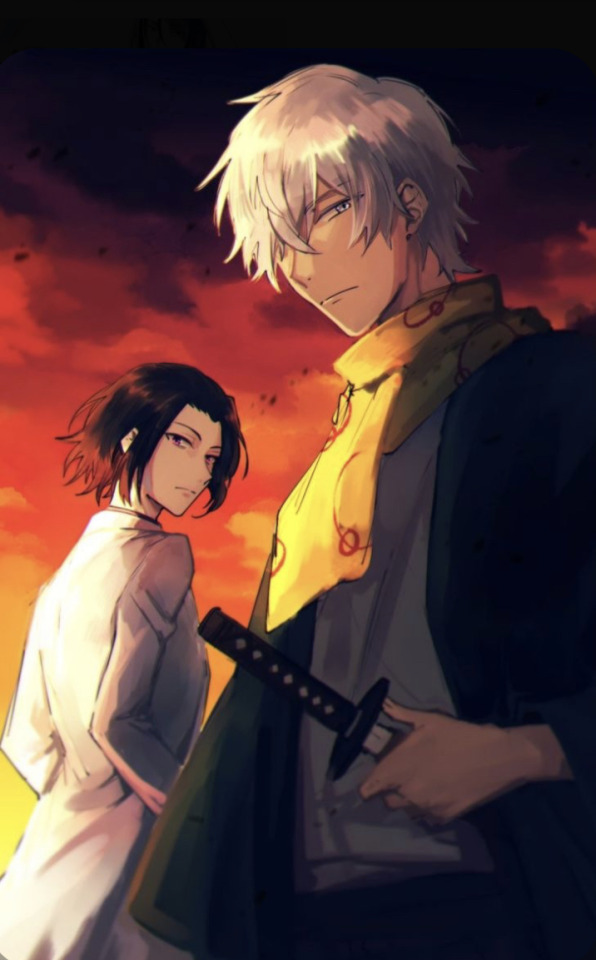
Why are Fukuzawa, Yosano and Natsume relevant you might ask? Well, let’s address the elephant in the room.
Let’s dissect season 1 episode 11 first (chapter 14 in the manga.)
We begin with how Mori Ougai is introduced, which is through Higuchi. After the failure that is capturing Atsushi and selling them for 4 billion yen/dollars Higuchi reports to Mori about their failure. This scene made me, a fan of the irl Mori Ougai’s work, open my eyes and ears to see how the two interact:
Higuchi: “I’m truly sorry for this.”
Mori: “Maybe he’ll never regain consciousness.”
Higuchi: “No way!”
Mori: “Don’t worry. You two have done you’re best. It’s true that you failed in the assault of the armed detective agency, erred during the capture of the man-tiger and sank the freighter along with our cargo. But you’ve done your best, and that’s all that mattered. Making effort is the most important. Results only come second, isn’t that right?”
Higuchi: “....”
Mori: “Oh, yeah. The trafficking company Akutagawa destroyed during the mission...the Remnants of Karma Transit seems to be recruiting. They’re probably planning to take revenge on Akutagawa.”
Higuchi: “what?”
Mori: “Listen, Higuchi-kun. The mafia is essentially an economic body that uses violence as its currency. It doesn’t matter at what got sunk or who got killed but if that violence is returned to us, all our expenses will become liabilities.”
Higuchi: “How could you call those liabilities? They were the fruits of of Akutagawa-senpai’s efforts up until now!”
Mori: “Indeed. Akutagawa-kun is highly capable. His violence is outstanding even in the mafia. **But what about you?** “
Higuchi: “....”
Mori: “Higuchi-kun. Have you ever wondered whether this job is really suited for you?”

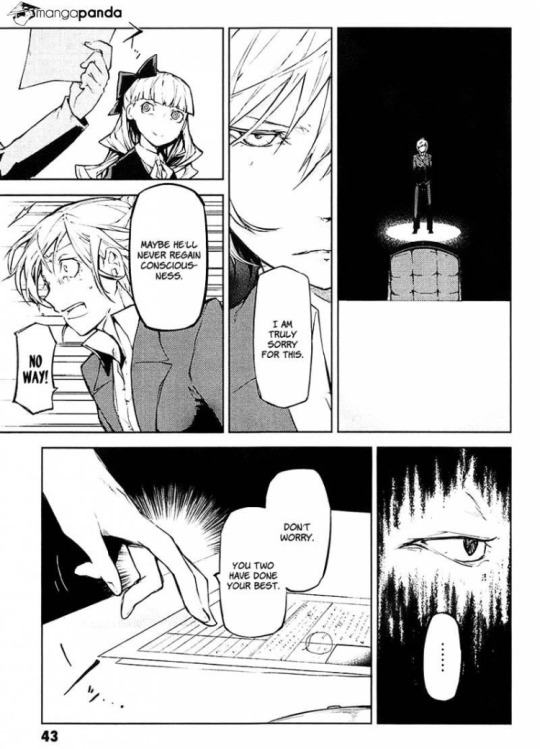
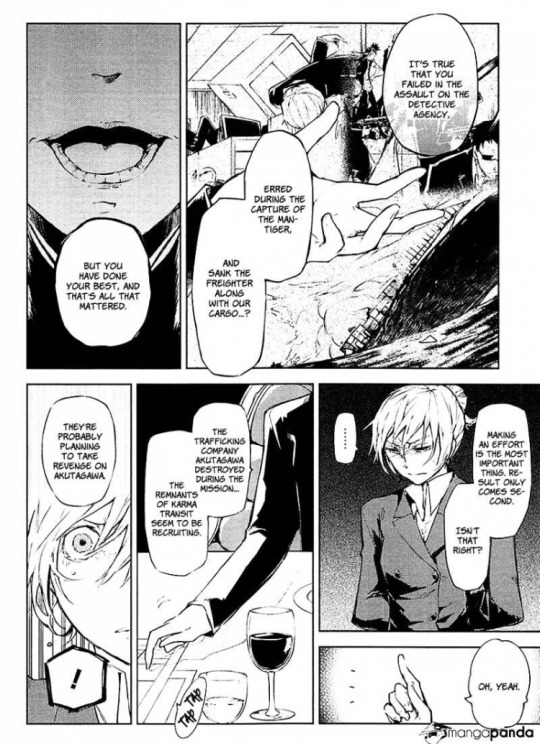
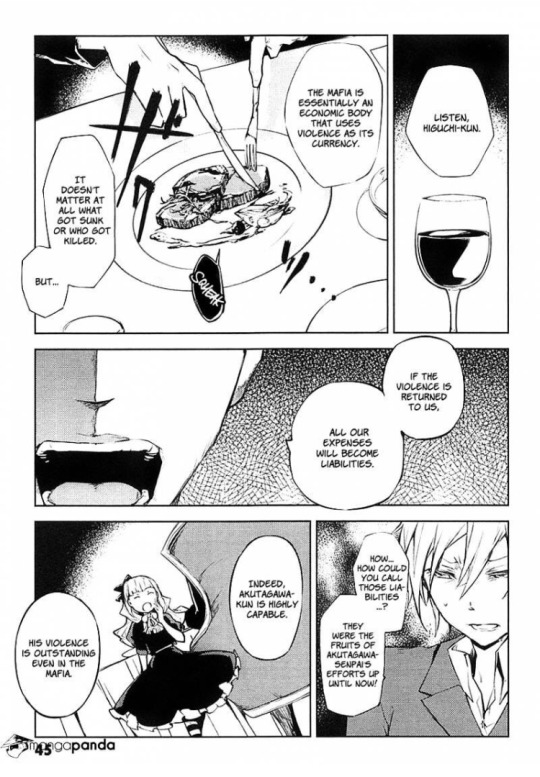
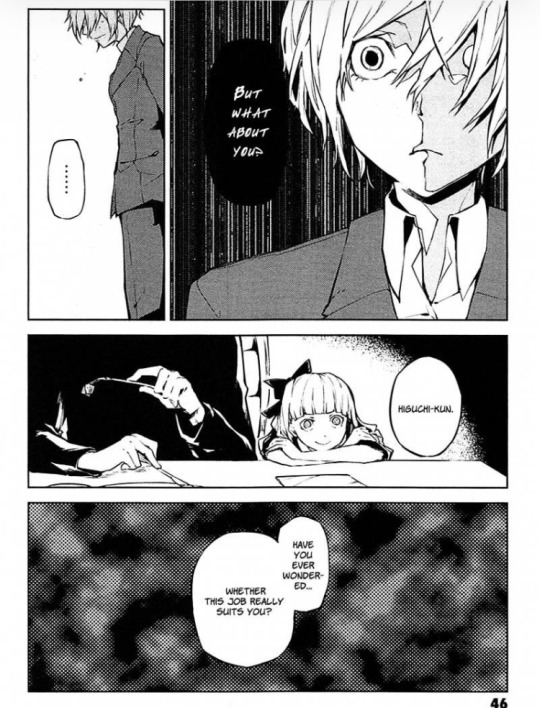
From what we have seen so far, Mori doesn’t seem angry at her actions. In fact, he seems more disappointed but with a hint of worry. Knowing real life mafia bosses, Higuchi would either get fired or tortured for her failures, yet she is here standing without any injuries. This is the most seen in the anime where Higuchi clearly is talking back to Mori, talking back to the king of the underworld.
The next scene is with the Black Lizards.
Tachihara: “This bastard Gin is always put onto sneaky jobs like infiltration and assassinations. Slitting the throats of families and friends on the higher ups order is quite a usual task. If he had meant it, you wouldn’t even have the time to gape.”
Higuchi: “Did the boss say he wanted me dead?”
Hirotsu: “Not yet, but who knows what will happen in the future.”
Higuchi: *cold face* “So you have come here to mock me?”
Hirotsu: “We’re only here to warn you to stay alert. If I were you I would come up with an insurance plan before the hitman starts closing in. The higher ups aren’t the only ones who are after your head. You and Akutagawa are the Guerrilla Squad directly under the boss’ command, giving you the authority to mobilize us in the combat squad, so your technically our superiors. However we don’t obey you out of your authority, but out of fear and respect for Akutagawa’s ability. Higuchi-kun, now that Akutagawa is out of action what power do you posses to make us obey you?”
Throughout the whole entire scene they say that Higuchi, despite her position as their superior, has not much authority over them. The only reason why they follow her is because she is under Mori’s direct order, so she and Akutagawa are second closes to Mori next to the executives.
Yet why is she here if she isn’t that important to the mafia according to the Black Lizards?
In the next page we see that she is against Mori’s order. Higuchi is going against Mori’s orders. This is a giant red flag because she is directly not following Mori’s order; this is enough to get executed under mafia rules yet she isn’t. How? How is she allowed to go through with this?
Let’s look further:
“But the only reason I never actually did it...”
“It’s not easy to break away from the mafia, but it’s not impossible.”
Let’s take the first sentence. She never finished it. She never said the reason why she never left. All we see is her remembering Akutagawa. This could mean one of two things; 1, she is in love with Akutagawa and wants to protect him or 2. She admires him for him using his ability more efficiently compared to her.
You might be asking, how did we go from Akutagawa to Higuchi’s ability? That’s simple.
Let’s remember Tachihara for example. At first we thought he wasn’t an ability user like Gin but it was later on revealed that his ability, Midwinter Memento, allows him to manipulate metal. While it has nothing in common, the name and the ability itself, this can be the same for Hirotsu.
Which means that authors have abilities, and Higuchi Ichiyou isn’t just some author. She is the first ever female author that got so high as being on a yen bill. So her not having an ability is rather suspicious.
Not only that but let’s look at how the novel 55 minutes describes her:
The novel described Akutagawa as an ability user, how would Higuchi not be described as a non-ability user? Because she is an ability user.
Which brings us back to the first take. Many mafioso’s would get in trouble for going against Mori’s word. With Higuchi it is differently; in season 1 episode 11 you see that Higuchi was talking to Mori on a rather even note, her eyes shined a few times which means that she appreciates the praises but she still went against his word by saying “Akutagawa has done so much to be considered a liability.” She talked back against the boss, that would be considered a punishment in the underground yet Mori kept her. This is also shown in the manga where in the mall, Higuchi talked once again back against him but Mori warned her as if she was a child that wants to know more about her birthday present.
Compare this to how he talks to Hirotsu; a mafioso who is longer in the mafia compared to Mori.
He talked back to him and he got a glare and was questioned “what do you want to say?” In a threatening type of way. Knowing Mori, it isn’t because of the former boss because Mori doesn’t care about him anymore nor is it about Dazai taking his place, that is his main goal.
My theory is that Higuchi’s ability is that big of a liability that she is Mori’s secret weapon.
In season 1 episode 11 she keeps saying “it is difficult to leave the mafia but the reason I stayed is because...”
She never finished her sentence. She never told the full reason why she stayed. In the manga we are shown that she isn’t respected, that subordinates walk over her. Yet even with these facts, Higuchi isn’t fired.
She also says “it is difficult to leave the mafia but it isn’t impossible”
That is a lie because as we have seen with Kyōuka it is impossible. How does Higuchi have such privilege? Because Mori knows she will come back. The reason why in her monologue it showed Akutagawa is because she admires him for being able to control Rashoumon, the same way how Atsushi finds Akutagawa amazing for being able to control Rashoumon.
Mori favors her, and this is shown in a panel in Wan where Higuchi does an impression of Mori when he is with Elise yet instead of being angry at Higuchi, Mori directs his glare to Chuuya and Tachihara. There is also a chapter where Tachihara, Higuchi, Akutagawa and Gin destroyed the Black Lizard hideout but instead of punishing Higuchi (who was the source of the accident) he punished them all.
Let’s look at another thing; how close is Higuchi with Mori?
Season 2 episode 8 where Mori was stabbed by Fyodor. It was brief but we see Higuchi together with the boss. Out of everyone in the mafia; Kouyou, Chuuya, Kajii hell even Akutagawa could (but he was busy looking for Nathanial) it was the least respected mafioso. Not only that but Higuchi back in season 2 gave information that the boss gave personally to Higuchi to send to Dazai.
This could have also been done by Hirotsu or Gin who know Dazai the longest. But something caught my attention. Higuchi said “I researched your history.” This wouldn’t seem bad was it not that Mori keeps Dazai’s executive position open for him to return, so Dazai is still technically an executive. ONLY EXECUTIVES are allowed to learn the history of the other executives. Gin, Hirotsu, Akutagawa, Kajii, Chuuya and Kouyou know about Dazai because they have an actual history with him but Higuchi is an outsider of this. She is like the other mafioso who aren’t related to Dazai yet she did research on him, which isn’t allowed.
Now this might sound as if Higuchi is special but let’s look at something or more someone who also didn’t look special but actually is special; Tachihara Michizo.
On the surface, Tachihara is an arrogant, impulsive, rash individual, more than willing to solve problems through sheer brute force and his dual guns. A violent temper leads to frequent conflict between him and other mafiosi, namely Gin, whom Tachihara views as creepy and frequently insults, leading to arguments, and Hirotsu, who often shuts Tachihara's temper down by threatening him. Tachihara's self-preservation prompts him to obey Hirotsu in the end, albeit reluctantly. An apparent thirst for battle and arrogance fuels Tachihara's temper. He's often seen with a rather feral smile on his face whenever fighting. He seldom considers the weight of a mission over the rush of eliminating his targets. He shows no hesitation nor remorse in murder, in fact sometimes urging to just eliminate a troublesome person if he finds their baggage more than they're worth.
A prideful man, Tachihara despises being underestimated and belittled. This is a surefire way to get oneself shot.
His rebellious side doesn't negate how he values orders, seeing them as an utmost system. Due to this, he attempts to dissuade Higuchi from saving Akutagawa against Mori's orders, even suggesting an alternate plan that wouldn't disobey these orders. Furthermore, he maintains his composure when dragged into shopping with Elise, and tolerates her putting bows in his hair. Despite guards laughing at him, Tachihara doesn't snap. Despite his rough exterior, Tachihara is capable of thinking rationally, just not in the heat of the moment in the Port Mafia. He can recognize danger quickly and finds himself on edge over how nonchalant Mori, Kōyō, and Chūya's meeting went. Tachihara has a proficient understanding of how to deal with the enemy, alluding to a much more cunning side of his true nature.
Much of Tachihara's details of joining the Port Mafia are unknown, however, it is a ruse. His identity as the fifth Hunting Dog reveals a much more clever, driven man. Unlike Ango Sakaguchi, Tachihara always intended to infiltrate the Port Mafia, using his position in the Hunting Dogs to operate as a spy. His confrontation with Yosano is devoid of any rage, depicting a cold, blunt side as he explains his grudge against her for "killing" his brother. Regardless of who he is working for, Tachihara cares deeply for his comrades. He was first to try to stop Higuchi when she tried to save Akutagawa on her own and has been seen visibly harboring guilt for when he cut down Hirotsu and Gin for the sake of his mission as a spy. He has also been seen caring for Teruko when she showed she was heavily injured from going against a plane head-on. He's also notably patient with those who are spoiled, including letting Teruko sit on her shoulders with little protests of being her "slave" and letting Elise put a bow on his head.
Beneath a lot of Tachihara's rough and punk-like exterior is a strong sense of incompetency and inferiority compared to his elder brother who was praised as being "perfect" while he was deemed by his family as being inferior, even being questioned as to why he didn't die instead of him. These things have driven Tachihara to act out and live a life of delinquency and ruthlessness by affiliating with gang activity, but despite these things, he still couldn't shake off these negative feelings. His insecurity and desperation to escape his brother's shadow was so strong, that Tachihara took on the first "order" that allowed him to become someone "not like his brother or his opposite" and joined the Hunting Dogs and infiltrate the Mafia to get revenge on Yosano for "killing" his brother, even when he knew and acknowledged that all of it was an excuse to appease his own negative feelings.
Many didn’t think much of Tachihara next that he was a commander of the Black Lizards and just someone who is close with Chuuya in Wan, however in the current arc we learn that he is a member of the Hunting Dogs with his ability Midwinter Memento being perfect for to lure Yosano to him, and in his fight with Fukuchi we learn that Mori giving him the order to kill Fukuchi was perfect for him.
Tachihara’s ability is named after his famous poem;
*Neither pursuing nor being pursued,
I stand under a barren tree. I'm watching
my silhouette, now marooned on a spotless snow....
(My pale shadow somberly takes shape.)
I'm listening. Yes! I certainly
am listening to what my shadow sings....
In a plaintively nasal voice it sings tunes of long-gone
summer flowers never to return.
Without responding, "That's a bunting, that's a siskin,
that's a white fir
—that's me...I a siskin, I a fir...," my shadow and I
eye each other as though these statements once were true.
My shadow listens to my heart at song.
Like the hubbub of that old arrowing brook,
it listens to tears at song...on the snow.*
This poem is seen mostly how Tachihara lives in the shadow of his brother, how much he listens to what others have to say because he himself can’t find a reason to do something.
As we already had established, Higuchi Ichiyou is a famous female writer. And the characters based on the authors and their books have an ability.
However there are two (three) categories: Name based abilities and non-name based abilities.
(Three being a non-abilities)
Non-abilities: The Great Old Ones and Ultra-Deduction.
Name based: Beast Beneath The Moonlight, Doppo Poet, All Men Are Equal, Lemon Bomb, The Great Fitzgerald, Thou Shalt Not Die, Gone With The Wind, I Am A Cat, A Feast in Time of Plague, Anne of Abyssal Red, Moby Dick, Time Machine, Yesterday’s Shadow Tag, The Grapes of Wrath etc.
Non-name based abilities: Vita Sexualis, Midwinter Memento, Another, An Inherent Drop, Black Cat in the Rue Morgue, Little Woman, Demon Snow/Golden Demon, Flawless, Futon, Plum Blossom in Snow, Priceless Tears, Undefeated By the Rain, No Longer Human, For The Tainted Sorrow etc.
Higuchi Ichiyou’s famous short story Takekurabe (Growing Pains) could be her ability based on that Mori Ougai had praised her for it, which eventually became they key to her success;
“ * [Higuchi Ichiyō’s] ‘Growing Pains’ was acclaimed as a masterpiece, especially when the entire work was republished in a single issue of the popular magazine Bungei Kurabu in April 1896, Mori Ōgai… lavishly praised its every feature: … (Ōgai): It is not especially remarkable that this author, a member of a literary circle in which the Naturalist school is said to be enjoying a vogue should have chosen to set her story in this place [the Yoshiwara district]. What is remarkable is that the characters who haunt this area are not the brute beasts in human form - the copies of Zola, Ibsen, and the rest - presented by the assiduous imitators of the so-called Naturalist school, but human beings with whom we can laugh and cry together… . At the risk of being mocked as an Ichiyō-idolater, I do not hesitate to accord to her the name of ‘poet.’ It is more difficult to depict a person with individual characteristics than a stereotype, and far more difficult to depict and individual in a milieu than a special person all by himself. This author, who has painted the ‘local coloring’ of Daionji-mae so effectively that one might say it has ceased to exist apart from ‘Growing Pains,’ without leaving any trace of the efforts such portraiture must have cost her, must truly be called a woman of rare ability.* “
(Credit to Donald Keene, Dawn to the West.)
But what could Growing Pains do if it was actually an ability? For most we need to understand what an actual ability needs to have in common.
For this we will take For The Tainted Sorrow and see how this ability is related to gravity?
With literal names based abilities we look at Atsushu. Atsushi has the ability to transform into a white tiger. At first, he doesn't seem to have much control over the transformation, likely due to the fact, or caused by, his unawareness of his state as an Ability user. After becoming an official member of the Agency and under the influence of All Men Are Equal, he gains more control over his transformations - as shown during his second fight with Akutagawa, when he breaks the transformation on his arms to escape.
My theory is that Higuchi’s ability allows her to paralyze her enemies.
Let’s look as too why I think this and use the summary of Takekurabe as an example; The main characters are children living on the edge of Yoshiwara, the only district of Edo that was licensed for prostitution. As they grow up, they find themselves assuming their family professions and losing the freedom they enjoyed as children. Next we have Nigorie translated into English as Troubled Waters and Muddy Water, is a Japanese short story written by Higuchi Ichiyō in 1895. It depicts the fate of a courtesan in the red light district of a nameless town during the Meiji era. Nigorie centers around Oriki, the most popular courtesan at the Kikunoi, a brothel in the red light district of an unspecified town, and a group of people connected to her, during the summer Obon festival. Through her conversations with other prostitutes, and Oriki's accounts in the presence of new customer Yūki Tomonosuke, the reader learns that a previous customer, Genshichi, a futon salesman of moderate affluence, was addicted to Oriki and spent all his money at the brothel. Now that Genshichi has been reduced to the hard labor of a construction worker, forced to move with his wife Ohatsu and his young son Takichi into a smaller flat in a run-down section of town, Oriki rejects seeing him despite his pleas. Tomonosuke repeatedly questions Oriki during his visits. She reminisces about her poor upbringing, which she cites, together with her profession, as the reason for not wanting to marry, although she had contemplated the possibility. She recounts a childhood incident when she was seven years old, sent by her mother to buy rice for supper. On her way back, she slipped on the frozen ground, spilling the rice into the gutter, leaving the family starving for this day. Meanwhile, Ohatsu scolds Genshichi for his ongoing obsession with Oriki and the family's poverty, which she tries to mitigate by doing piecework. When Takichi comes home with a piece of cake, which he received as a gift from Oriki (whom he refers to as "the demon-lady"), Ohatsu angrily throws it away. Genshichi, furious about her ongoing accusations and behaviour, demands that she leaves him. Ohatsu begs him to let her stay, as she has no relatives she can return to, but finally leaves, taking their son with her. At the end of the festivities, the dead bodies of Oriki and Genshichi are found. While it seems obvious that Genshichi committed suicide by seppuku, the cause of Oriki's death stays unclear. The passerbys speculate about her fate; while one assumes a shinjū (double love suicide), another one reasons that the wounds on Oriki's body make a murder after her attempted escape more plausible. It is left to the reader to determine the true circumstance of her death.
From these famous stories we can already determine that Higuchi’s stories are centered around the concept of one-sided attraction. This is something she and Akutagawa have, a one-sided attraction. This is the most in season 3 episode 5 where Higuchi doesn’t seem to find her way of trying to confess that she loves Akutagawa or that she thinks she admires him. And what is there not to admire about Akutagawa? He has an amazing ability, he is reliable in many ways but is just stubborn. So with this in mind, Higuchi’s (if this theory is correct) ability comes in this form; Higuchi’s ability is a mix of a non-name based ability and a name-based ability. The ability of paralyzation has the meaning of that she is paralyzed by fear with job as a mafioso but also her fear of being rejected by Akutagawa and that it is the greatest liability Mori has in order to protect Yokohama-This idea comes more in mind in the manga, Chapter 41, where we briefly see Higuchi’s little sister. This may not mean much to you but Higuchi is the only confirmed character with a little sister who isn’t based on a book (Gin=Ogin and Naomi=Naomi). Which leads me to the reason why she doesn’t use her ability anymore or is restricting herself- and the second is the meaning of Growing Pains ; Growing pains are often described as an ache or throb in the legs — often in the front of the thighs, the calves or behind the knees. Growing pains tend to affect both legs and occur at night, and may even wake a child from sleep. Although these pains are called growing pains, there's no evidence that growth hurts.
There could have been an incident in which Higuchi accidentally used her ability on her little sister which resulted in her little sister being paralyzed. She could have met Mori and knowing Mori he manipulated in keeping her ability a secret and for repayment let her join the mafia. This idea is further proven with how he was with Yosano; after the death of Tachihara’s brother Mori manipulated Yosano into thinking that this is her fault, almost making her join the mafia out of guilt was it not for Ranpo.
6. Maybe Higuchi wasn’t as lucky and thought that what Morti said was true and joined the mafia out of guilt, which leads me as to why she fell in love with him. The nightingale effect; The Florence Nightingale effect is a trope where a caregiver falls in love with their patient, even if very little communication or contact takes place outside of basic care. Feelings may fade once the patient is no longer in need of care. Higuchi fell in love with Akutagawa not out of admiration but out of care for him. That guilt of not being able to take care of him could be because of her little sister and the fear that Higuchi one day paralyzes Akutagawa, as to why she isn’t using her ability. After all, this isn’t the first time there was a character who hid their ability to do things without it; Fyodor and Tachihara.
And the last thing that might confirm Higuchi’s importance is the way she acted in Wan and the Onsen drama CD. While Wan is merely a comedy it does call out the characters for their flaws and unique personalities, meanwhile the Onsen drama CD is like a filler but adds information about certain characters and their relationship; Higuchi included.
1. She stalks Akutagawa at first out of fear that other organizations might attack him, but at this point she stalks him with a mix of worry and not being capable of walking up to him.
2. She is rather open to nudity as shown that she said to Chuuya “it is my job to help Akutagawa even it means being naked” (or something along those lines).
In a certain chapter however where the Port Mafia had to disguise themselves as Mori, Higuchi was up and while she failed to look like Mori because she is very feminine she then used another tactic which is acting like Mori when he is with Elise. For most, Mori would have either glared at them and give them punishment, he glared at Chuuya and Tachihara (who were the closest next to him) instead at Higuchi. Higuchi broke many Port Mafia rules, many times she failed and has unintentionally mocked him yet she is still here.
so what do you guys think? Is this theory plausible?
#higuchi ichiyo#higuchi bsd#theories#speculation#bungou stray dogs#mori ougai#yosano akiko#tachihara michizou#ability
89 notes
·
View notes
Text
Fanganronpa Revival of the Truth; Antagonist: Oshoku Ito

Don’t be fooled by this pretty lady’s appearance. Oshoku Ito is our main antagonist of this story! Being the Ultimate Prosecutor, Oshoku is no stranger to the court room. She is well versed in making her point and getting it heard. She comes across as very cold and reserved, but she doesn’t shun all people immediately. She is plenty capable of making idle and normal conversation, and even making friends. However whether they can take her abrasive tendencies is another story.
Oshoku is familiar with our protagonist Kame, the two having been on many cases together. She also knows the Ultimate Defense Attorney Tada Mamoru(more on him later)quite well, though neither man hold her in high regards.
Just like Kame, Oshoku has a very strict moral code when it comes to the law. It is not the same as the judge’s, however. Oshoku believes all criminal’s deserve to be punished, no matter the crime, and if anyone is being blamed for a crime they are to blame for being in such a position in the first place. Basically, she believes in guilty until proven guilty. She also believes everyone has the capacity to be a criminal, no exceptions, and once they become one there’s no going back.
Oshoku has done some shady and outright wrong things, but all in what she believes to be right. She isn’t an evil person, her morals just don’t align with the norm. All of this will be yours to decide when you discover the truth!
Report Card
Name: Oshoku Ito
Talent: Ultimate Prosecutor
Age: 17
Gender: Female
Sexuality: Bisexual, male leaning
Height: 5'5"
Weight: 120 Lbs
D.O.B.: June 19
Likes: Cheesecake, owls, classic literature
Dislikes: Criminals, arrogance, frogs
#revival of the truth#fanganronpa#fangan#danganronpa fangan#danganronpa#original content#original character#original characters#original story#writing#antagonist#Oshoku Ito
4 notes
·
View notes
Text
Rubin ‘Rubi’ Orn

“A tall, redheaded stern faced woman with an ugly curse scar across her face. Wouldn’t fancy meeting her in a dark alley.”
- Chaotic Neutral
- Born September 22, 1948 on the Faroe Islands.
- Asexual.
- Was the result of a fling of Henry’s before he married his first wife. Her mother, Elsa, is a half-blood.
- Alumni of Drumstrang. Recommends attending one of the smaller schools or even a school out of the area when asked about her time there.
- Drumstrang does not have ‘houses’ in the traditional sense but they do have different schools of Magic that students can focus on after their third year. Rubi chose seiðr or Old Norse magic.
- Sees magic as a neutral force, it is only as Light or as Dark as those using it.
- Morally grey.
- sarcastic.
- Worked as a spy during the First Wizarding War. Later hunted Death Eaters for a time before becoming a professional Duellist.
- Hates Grindelwald with a burning passion.
- Blew her cover after Death Eaters targeted her father’s children (Hecate and Jacob.) Brutally killed three of them, two escaped.
- Owns a Kneazle named Sam and speaks with him at length on various subjects. Values his opinion. Hecate, Bryn, and Sean are concerned.
- Moved two houses down from Hecate’s house after the incident with the death eaters
- Her patronus is a wolverine. Has no idea what it is, refers to it as a “Fucked up Badger thing.” Her memory is holding Hecate and Jacob for the first time.
- Practices an older, more traditional form of wandless magic. Uses plants, crystals, and bones in her spells. Does have a wand for duelling.
- Yew Wand, 11 inches, springy flexibility, and a vial of Swooping Evil venom as a core.
Popular in Ireland and Scotland, the European Yew is a wand wood of death and rebirth. The owner values honor highly, and would often prefer to die rather than submit or surrender in extreme cases. They often have a preoccupation with religion, spirituality, spirits, reincarnation, and the after-life.
These witches and wizards are independent, and may refuse the help of others (this may be overcome later in life, but will be especially prominent in their youth). It takes them much time to develop as people, as well as to develop their magic.
The unusual quality about yew wood itself is how flexible the wood is, despite its great hardness and strength (for being a softwood). The owner is similar in that they have strong convictions but are flexible in the manner in which they accomplish goals or uphold their convictions. They have an inner-resilience which allows them to spring back from metaphorical deaths.
They can be exceptionally protective of those they’ve ‘claimed’ as their own, and make for frightening adversaries
A powerful core, swooping evil venom has an odd reputation as it is capable of the most terrifying mind-altering spells as well as the most potent mind-healing magic. This core chooses creative witches and wizards, with great imaginations. Often, this reveals itself in endeavors like stone carving as well as creating the most ingenious and twisted of hexes and jinxes. Their owner’s head in the clouds appearance belies their talents in offensive magic and manipulation. At their worst, they can be a bit sadistic and play head games on other people for their own amusement. There is talent in magic to do with darkness, memory, the mind, hiding, and concealment. This core also possesses a latent soul-based magic, which is activated by specific wand woods (such as camphor). Otherwise, it gravitates towards woods with a darker nature such as blackthorn or snakewood.
(Description courtesy of cloverlywands blog)
Wren Ito (Maiden name: Ames)

“Their older sister, Wren, was a fine student of my house. Quiet, made almost no trouble for anybody. Clearly that must have come from her mother.”
- Lawful Good.
- Born January 1st, 1950 in London, England.
- Pureblood (technically).
- Ravenclaw, the first in the Ames family
- Daughter from her father’s first Marriage to Nancy Ames (Maiden name: White). Her mother was the muggleborn daughter of a Mortician and a housewife.
- Nancy was murdered in 1955, the murder was never solved but was believed to have been committed by an early version of Death Eaters. Wren was with her grandparents at the time of the murder.
- Wren was a good student during her time at Hogwarts but was generally quiet and unassuming. Her favorite class was Ghoul Studies and her best class was Astronomy. Involved in Astronomy Club and Ghoul Club
- Became interested in Ghouls due to her mother sticking around for two years after her death and because Muggle Shades often hung around her grandmother, the daughter of a muggle and a Squib, who had a mild version of second sight.
- Slight build with light brown hair and tiny. Looks nothing like her younger siblings.
- Met her future husband Osamu at the Triwizard Tournament.
- Her patronus is a fox, which is her husbands Animagus form. It was previously a field mouse. Her happy memory is her first date with her husband.
- Really dislikes Rakepick as she went to school with her.
- Still a quiet person but has developed a very wry sense of humor from her husband. Also loves Puns. This causes great pain to her family.
- Lives on Mahoutokoro school grounds with her husband and two children Sara and Mirou. Her husband is the Professor of Transfiguration and she writes books on Ghouls and Shades (Muggle ghosts). Is considered the foremost expert on the subject. Uses a typewriter rather than a quill.
- Her wand is Mahogany, 12 inches, swishy flexibility and a mermaid hair core.
Mahogany wand owners are charismatic, energetic, and possess much curiosity. They have above average magical cores, and great endurance. They like to be intellectually stimulated and become bored very quickly. The lion’s share of their energy goes towards what interests them, and they neglect that which does not. There is a regal air to their mannerisms, and a devil may care attitude in their interactions with others. They care little for others’ opinions, but also care too much on the opinions of those they admire or are close to them.
Most subjects and knowledge comes easily to them, and they can come up with innovative solutions incredibly fast.
Though they can be sweet and protective of their loved ones, these witches and wizards are also jealous and vengeful to those they dislike. Many times,their dislike is arbitrary or due to jealousy. They can be extremely possessive and controlling at their worst.
Merperson hair wands’ reputation varies by the subspecies and by cultural norms. What is shared between people with this core, it that they all are creative and imaginative, and usually have some sort of musical talent. These witches and wizards also have a talent with language, and may learn foreign languages with relative ease. ‘Restless’ describes these people well, and they like to investigate and explore. They are always searching for something, and even they don’t know exactly what it is. They can become irritated by those who try to force a routine on them, or those who try to tell them how to live. Adventurous at heart, they like to try new things or novel approaches. They don’t care for doing something just because it’s “tried and true.” Finding new and better ways is important to them, testing the limits of what is possible and what they can accomplish.
Fiadah O'Faud.

“All O’Faud’s are Blood Traitors. Especially that one.”
- Technically Chaotic Good. Lawful Chaotic would be a better term.
- Born April 1st 1951, in a home for unwed mothers in County Galway Ireland. Was the result of an affair between her mother Brigid O’Faud and Henry Ames.
- Pansexual
- Has a half-Veela partner of seven years named Simon Jones.
- Pureblood.
- O’Faud’s had not been allowed at Hogwarts up until about 1914 due to an ancestor killing the grandson of Salazar Slytherin because he (allegedly) married and then murdered Callum O’Faud’s granddaughter, who was a squib. They were not allowed in Slytherin until 1951.
- Her mother and stepfather immigrated to America when she was 13 years old. They both still currently live in Boston, Massachusetts. She transferred to Ilvermorny and was sorted into Wampus House. Was originally in Slytherin.
- Visits all her half siblings often, especially Hecate, Bryn, and Danny.
- Fiadah works as a magical law Prosecutor in America and takes cases that mostly involve violence against Creatures, Muggles, Squibs, Muggleborns, and foreigners.
- Cunning and extremely bullheaded but surprisingly well spoken. Does not look like she would be well spoken.
- Dry as dead leaves humor.
- Covered in magical tattoos that move around her body. Currently has a snake, a thunderbird, two crows, a raven, a hare, a spray of flowers that bloom in the morning and close at night, and a Thestral.
- Average height with black hair in a pixie cut and black eyes.
- Animagus form is a crow.
- Patronus is an Irish Hare. Her happy memory is introducing Hecate, Sean, Bryn, and Jacob to American rock the day she got her law certification.
- Saw her grandmother die (cancer).
- Lives in rural Georgia. Does not speak to any of her parents, does not like them.
- Plays the fiddle. When she tells someone she played them ‘Like a fiddle’ that’s a compliment, Fiddles are hard to play.
- Her wand is a Redwood wand, 13 inches, slight flexibility, and a dragonheartstring core.
Prized in California and Pacific Northwest, redwood is notorious for its owner’s ability to survive the impossible (Pottermore). Which is fortunate because they seem to be danger magnets. Their personality and natural skill set that this wand is attracted to also make for people who thrive under pressure and against the odds.
These witches and wizards have good reflexes as well as good judgement and foresight. Not much surprises them and what does surprise them, they react and adapt to with ridiculous ease. As Ollivander states, they have a talent for turning disaster into opportunity.
Brave and adventurous, not much intimidates the owner of a redwood wand.
As a rule, dragon heartstrings produce wands with the most power, and which are capable of the most flamboyant spells. Dragon wands tend to learn more quickly than other types. While they can change allegiance if won from their original master, they always bond strongly with the current owner.The dragon wand tends to be easiest to turn to the Dark Arts, though it will not incline that way of its own accord. It is also the most prone of the three cores to accidents, being somewhat temperamental.
(Description courtesy of cloverlywands and pottermore
3 notes
·
View notes